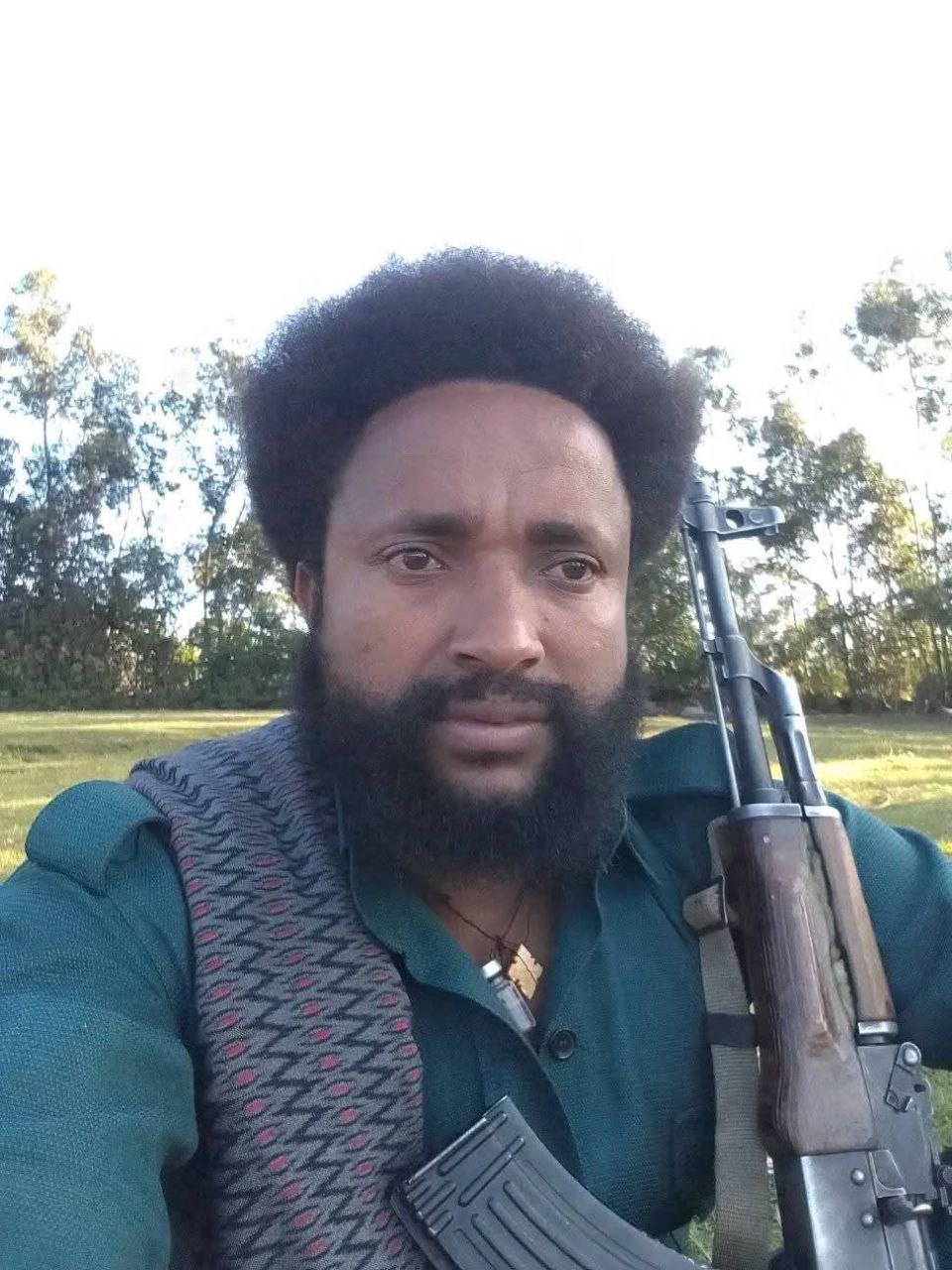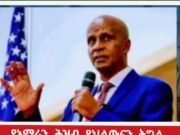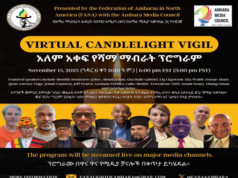Last week, the regime in Ethiopia announced its abduction of Andaragatchew Tsgie, General Secretary of the Ethiopian opposition group known as Ginbot 7 Movement for Justice, Freedom and Democracy, with smug delight. According to the regime, the “Ethiopian national security service coordinating with its Yemeni counterpart had detained and transferred to Ethiopia [Andaragatchew Tsgie] as he tried to enter Eritrea through Sanaa [Yemen].” Andargatchew is a British national of Ethiopian origin. Yemeni officials denied Adargatchew access to British consular officials, legal representation and contact with family members before subjecting him to extraordinary rendition to the regime in Ethiopia.
In what appears to be a secretly recorded 63-second video clip released by the regime, Andargatchew is seen stoically reflecting on his abduction. He declares, among other things, that he is “at peace” with himself and has “no anger or ill-will” towards his captors. Is the man shown in the video clip speaking freely or repeating what he is told to say by his captors? Was Andargatchew aware that he was being secretly videotaped for propaganda purposes when he made his “statement”? Does the video clip depict a man speaking words of quiet defiance or pleading for mercy before his abductors? Is the whole drama staged in the video an attempt by the regime to hoodwink Andaragatchew’s supporters, international human rights organizations and the British government? What did they do with Andargachew for over two weeks before officially announcing his capture and extraordinary rendition? I do not know the answer to these questions, but I was surprised by the stoicism, composure and calmness exhibited by a man trapped in laughing hyenas’ den with glinting teeth bared at him.
It is not clear to me why the regime released the video clip of Andargatchew’s video “statement” over 2 weeks after his reported arrest and rendition on June 23. I believe the regime aimed to achieve a number of propaganda objectives with the “statement”: 1) Prove to Ginbot 7 and other opposition elements that the regime has intelligence and tactical capabilities to act against its enemies and opponents at least with the broader Horn of Africa region. (By the way, the regime’s arrest and rendition of Andargachew reminded me of theinterview given by an Addis Ababa police chief known as Zemedkun to a Voice of America- Amharic program reporter. After berating the VOA reporter on the air, Zemedkun warned the reporter, “I don’t care if you live in Washington or in Heaven. I don’t give a damn! But I will arrest you and take you. You should know that!!) It seems the regime delivered on Zemedkun’s threat in Yemen when it arrested Andargachew. The regime wants to send the message out that they will get their enemies in transit in Yemen, living in Washington or even if they have gone to Heaven.) 2) Disprove any claim that Andargatchew has been physically or psychologically tortured, mistreated or abused. 3) Prove that Andargatchew is actually being treated well and in a dignified way (Andargatchew appears physically unharmed (at least his face does not appear to show any visible signs of trauma). He appears in the video clip in his regular causal wear in a room that appears to be a stark police interrogation chamber). They also wanted to show a “relaxed” Andargatchew who does not exhibit the usual disorientation, stress, anxiety and depression of victims of extraordinary rendition. 4) Preemptively and proactively deflect any criticism or complaints from human rights groups and others that Andargatchew has been or is highly likely to be tortured in detention. 5) Embarrass Ginbot 7 and its leadership by demonstrating that the regime has penetrated and compromised that organization’s internal security by planting a mole (a deep cover agent) to report on sensitive organizational activities. 6) Prove that the Ginbot 7 organization is effectively neutralized and fatally incapacitated with the capture of Andargatchew and any information they could extract from him by torture and other means. 7) Demoralize the whole Ethiopian opposition and psychologically paralyze them from mounting an effective challenge in the fake election scheduled for 2015. 8) Prove that the regime can flout the rule of international law and get away with it — without the objection and implicit blessing of the Western donors and loaners– as it has done dozens of times before. I am sure conspiracy theorists have their own explanations.
It remains to be seen whether the regime has achieved any or all of these objectives by abducting Andargatchew. However, I am reasonably sure that regime members have popped crates of champagne bottles and done do-si-does right into the night for a well-concocted and -executed abduction. Should the regime now do a final victory lap over Andargatchew’s abduction? I doubt that any one person could be the soul, body and mind of any organization (with only one exception, Meles Zenawi). It seems reasonable to conclude that Andargatchew’s abduction could be a significant setback for Ginbot 7. I doubt it will necessarily spell doom for that organization. Similarly, time will tell whether those who asserted Andargatchew will be tortured for information are correct. Nonetheless, the social scientific data and analyses show compellingly that torture in ordinary criminal investigations and in extraordinary renditions produces lies not truth.
For the record, I have never met or spoken to Andaragatchew Tsgie. I have seen his videotaped interviews and read some public statements he has made online. I know that the regime has convicted Andaragatchew of committing “terrorism” and sentenced him to death in the regime’s kangaroo courts. It is precisely this question of kangaroo justice and the flagrant violation of the rule of international law in Andargatchew’s extraordinary rendition that compels me to write this commentary.
State terrorism through the use of “anti-terrorism law” and violation of the rule of international law
The hallmark of any failed state is the absence of the rule of law. The hallmark of the failed criminal state is the flagitious violation of the rule of constitutional and international law. I see little difference in principle between what Boko Haram did in Nigeria to abduct nearly 300 young women three months ago and what the regime in Ethiopia has done in the abduction of Andargatchew Tsgie. The regime argues that Andargatchew is a “terrorist” and has been sentenced to death in absentia under the so-called anti-terrorism law (Anti-Terrorism Proclamation No. 652/2009 ). As I have demonstrated in dozens of commentaries since 2006, the prosecution of political opponents for “treason” and “terrorism” in Ethiopia is a legal persecution and lynching of political opponents in kangaroo court. As numerous annual U.S. State Department human rights reports have documented, Ethiopia’s anti-terrorism “law” is merely a convenient mechanism for “politically motivated trials and convictions of opposition figures, activists, journalists, and bloggers, as well as increased restrictions on print media.” A conviction and a sentence of death for those charged with “terrorism” is foreordained and a foregone conclusion. The fact of the matter is that a sentence of death on a person charged with “terrorism” in Ethiopia’s kangaroo courts is like a sentence of capital punishment on an antelope at a convention of hyenas. In a country that lacks judicial independence and where judges are instructed to make legal determinations, no conviction and imposition of the death penalty could stand fair and independent legal scrutiny.
It is a misnomer to call the regime’s “anti-terrorism” proclamation a “law”. Proclamation 652 is “law” of the bush, the jungle. As I have demonstrated in my commentary, “Ethiopia: Dictatorship is State Terrorism”, Proclamation 652 is an arbitrary and capricious diktat conceived and crafted by the late Meles Zenawi and approved by his rubberstamp parliament. That proclamation has been thoroughly condemned and criticized by all of the major international human rights organization. For instance, Human Rights Watch criticized that “law” for providing “an extremely broad and ambiguous definition of terrorism that could be used to criminalize non-violent political dissent and various other activities that should not be deemed as terrorism.” Even the U.S. State Department expressed its disapproval of the “extremely harsh and politicized use of Ethiopia’s anti-terrorism law” in persecuting political opponents. To add insult to injury, in every single suspected case of “terrorism”, Meles Zenawi and his spokesmen have made outrageous and prejudicial public comments and levelled angry and unsubstantiated accusations against “terrorism” suspects while trials are underway, violating the suspects’ constitutional right to the presumption of innocence and a fair trial. It is also a fact that all suspects accused of “terrorism” by the regime have been denied right to counsel and other constitutional rights during interrogations and subjected to physical and psychological torture. The regime has also exerted political pressure on the courts to make findings of guilt in “reason” and “terrorism” cases.
Preaching the rule of international law to outlaws
I have always said that preaching rule of law to the regime in Ethiopia is like preaching Scripture to a gathering of deaf, mute and blind Heathen or pouring water over a slab of granite. It goes in one ear, passes through a vacuum, and out the other. As a constitutional lawyer who takes great pride in defending the rule of law, I must keep on preaching, teaching and defending the rule of law with full knowledge that regime in Ethiopia does not give a rat’s behind about the rule of law, due process, international law, its own Constitution, and least of all, anything I have to say. Regardless, I must speak out because I have a moral duty to do so. Those who practice silence when the rule of law is trampled are passive accomplices in the triumph of the rule of thuggery over the rule of law.
What the regime did in abducting Andargatchew with the active cooperation of the Yemeni government is an act of thuggery called “extraordinary rendition”. It is a fancy phrase coined by the Central Intelligence Agency to justify the secret extrajudicial arrest, detention and extradition of an individual suspected of “terrorism” to the custody of another state. It is essentially a form of outsourcing interrogation by torture to countries where torture is commonly practiced. Logistically, individuals suspected of involvement in terrorism are captured and detained by foreign authorities on foreign soil and transferred to another state for interrogation under conditions of torture and physical and psychological abuse.
The regime in Ethiopia is not new to the criminal practice of extraordinary rendition. In fact, it is one of the top practitioners of that criminal activity. Beginning in 2007, a total more than 100 terror suspects have been arrested in Somalia and Kenya and transferred to Ethiopia to face interrogation by regime and US intelligence and law enforcement officials. None of the rendered prisoners was given access to or allowed to retain counsel during interrogation. Many were interrogated under circumstances of physical and psychological torture. In specific cases, among others, the regime in Ethiopia has hosted the interrogation of Yasser Tinawi, who was subsequently flown to Egypt and rendered to Syria. Mohammed Ali Isse and Omar bin Hassan were also rendered to Ethiopia. Isse was tortured with electric shocks by his Ethiopian interrogators.
Extraordinary rendition violates every rule in the human rights book. The rendition process invariably involves forceful abduction or kidnapping. The victim is detained incommunicado and without due process of law for an extended period of time. They are often interrogated for extended periods and subjected to physical and mental torture. The victim of rendition is not afforded an opportunity to contact consular officials before being whisked away to the rendition destination. Rendition victims are prevented from having access to family members, friends and health care providers. They are often held in solitary confinement in secret prisons and prevented from challenging their detention in a court of law.
Convention Against Torture
The right to be free from government-sponsored torture is a fundamental and universal right recognized under the highest principles and conventions of international law. States are also under the absolute and unconditional obligation to subscribe to and practice the principle of non-refoulement (not returning a person to a place where that person is likely to face persecution, torture, etc.). This obligation is so “fundamental that it is binding on all states, and no nation may derogate from or agree to contravene them.” It also applies to all states irrespective of whether they are signatories to any particular treaty prohibiting refoulement. torture such transfers and regardless of the offenses allegedly committed or the danger posed by the individual concerned.
The Convention Against Torture and Other Cruel, Inhuman or Degrading Treatment or Punishment has been signed (by “accession”) by Ethiopia (March 14, 1994) and Yemen (November 5 1991) (CAT). Article 3 of the CAT specifically provides that “[n]o State Party shall expel, return (“refouler’), or extradite a person to another State where there are substantial grounds for believing that he would be in danger of being subjected to torture. For the purpose of determining whether there are such grounds, the competent authorities shall take into account all relevant considerations including, where applicable, the existence in the State concerned of a consistent pattern of gross, flagrant or mass violations of human rights.” Article 1 defines torture as “any act by which severe pain or suffering, whether physical or mental, is intentionally inflicted on a person for such purposes as obtaining from him or a third person information or a confession… [and] … when such pain or suffering is inflicted by or at the instigation of or with the consent or acquiescence of a public official or other person acting in an official capacity.”
Torture and ill-treatment are tools of trade for the regime in Ethiopia. Confinement in the stinking prisons and jails in Ethiopia is itself torture and a monumental crime against humanity. One need only read the regime’s secretly commissioned report of the prison system by retired British Colonel Michael Dewars to get a glimpse of the horrific and shocking conditions of penal servitude in Ethiopia. Human Rights Watch has documented incidents of torture and ill-treatment by Ethiopian security forces in a range of settings. “Torture and ill-treatment have been used by Ethiopia’s police, military, and other members of the security forces to punish a spectrum of perceived dissenters, including university students, members of the political opposition, and alleged supporters of insurgent groups, as well as alleged terrorist suspect. The frequency, ubiquity, and patterns of abuse by agents of the central and state governments demonstrate systematic mistreatment involving commanding officers, not random activity by rogue soldiers and police officers. In several cases documented by Human Rights Watch, military commanders participated personally in torture.” Torture techniques and methods vary. “Repeated and severe beatings with sticks, electric cables, rifle butts, iron bars, or other hard instruments is the most frequent method of abuse. Occasionally, police and soldiers resort to other methods, such as immersing victims’ heads in water; beating and kicking victims while they hang bound upside down; tying bottles of water to testicles; and forcing detainees to run or crawl barefoot over sharp gravel for several hours at a time. Some victims have suffered serious permanent injury; a few have been tortured to death… Although Ethiopia has criminal code provisions and other laws available to enforce its international and domestic obligations, they are seldom enforced. Very few incidents of torture have been investigated promptly and impartially, much less prosecuted.”
There is considerable concern expressed by various international human rights groups, Ginbot 7 and others that the regime will torture and abuse Andargatchew in an effort to extract information from him. This concern cannot be easily discounted. The regime in Ethiopia has a long history of using torture dating back to their days in the bush. I submit four notorious cases of torture and ill-treatment of detainees by the regime. Birtukan Midekksa, the first woman political party leader in Ethiopian history, was held in solitary confinement for months and subjected to psychological and physical torture after she was jailed by the late Meles Zenawi in 2008. When asked about Birtukan’s condition in solitary confinement in 2010, Meles Zenawi joked, “The health situation of Birtukan, the last I heard, is in perfect condition. She may have gained a few kilos, but other than that, and that may be for lack of exercise, I understand she is in perfect health…” I have documented Meles’ sadistic treatment of Birtukan in numerous commentaries. In 2010, Ethiopia’s foremost defenders of press freedom, the husband and wife team of Eskinder Nega and Serkalem Fasil wrote in their letter to Columbia University President Lee C. Bollinger describing the inhumane and barbaric treatment they received in the regime’s jails. “… Severely underweight at birth because Serkalem’s physical and psychological privation in one of Africa’s worst prisons, an incubator was deemed life-saving to the new-born child by prison doctors; which was, in an act of incomprehensible vindictiveness, denied by the authorities.”
In 2013, the Committee to Protect Journalists (CPJ) documented the abuse and ill-treatment Reeyot Alemu, a young woman journalists, suffered in the regime’s prison. CPJ wrote, “Prison authorities have threatened Reeyot with solitary confinement for two months as punishment for alleged bad behavior toward them and threatening to publicize human rights violations by prison guards, according to sources close to the journalist who spoke to the International Women’s Media Foundation on condition of anonymity. CPJ has independently verified the information. Reeyot has also been denied access to adequate medical treatment after she was diagnosed with a tumor in her breast…” In March 2014, seven young Semayawi (Blue) Party women members were arrested, beaten and jailed for demanding the release of political prisoners and respect for their basic human rights during a 5k run. I need not mention the tens of thousands of men – opposition party leaders and members, dissidents, civil society leaders, human rights advocates and others — who have been subjected to torture, ill-treatment and abuse at the hands of the regime in Ethiopia.
I suspect there are some in the regime who want to see Andaragachew humiliated, embarrassed and disgraced. Revenge, retribution and retaliation is like mother’s milk to them. Careful examination of the anecdotal evidence of the regime’s record of treatment of their enemies and opposition suggests that they are extremely vengeful, vindictive, unforgiving and sadistic. I have come to the conclusion that the regime relishes seeing their victims in pain and enjoy inflicting suffering on them. The late Meles Zenawi, the “enlightened visionary leader” of the regime, was a man who derived sadistic pleasure from humiliating and degrading his opponents. I was outraged and inflamed by his calculating and sadistic dehumanization and degradation of Birtukan Midekssa. Meles suppressed any trace of human compassion, decency and mercy he may have had by acting sadistically against Birtukan. The point is that I expect Meles’ apostles to follow their visionary leader and sadistically deal with Andargatchew. I do not think the hard-core members of the regime will be satisfied by Andargachew’s capture and detention. It is not enough for them to have “won” the war against Ginbot 7. The only thing that will soothe their tortured souls is to see their nemesis tortured, humiliated, tarred and feathered. Power in the hands of the unenlightened breeds sadism.
Yemeni liability under the CAT
A state which knowingly aids or assists another state in the commission of a violation of international law (extraordinary rendition) is liable for accomplice liability. Yemen by knowingly rendering Andargachew to the regime in Ethiopia (which is notorious for using torture, secret detentions and enforced disappearances) is in clear violation of the CAT. The government of Yemen is accountable for accomplice liability for knowingly detaining, providing practical and logistical assistance and delivering Andargatchew to the intelligence service of the regime in Ethiopia with full knowledge that there are “substantial grounds for believing that Andargachew is in danger of being subjected to torture.”
Article 3 of the CAT requires an assessment of “all relevant considerations” relevant to any “consistent patterns of gross, flagrant or mass violations of human rights,” when determining whether an individual held for rendering or extradition is likely to endure torture upon his return. Yemen callously disregarded this essential requirement when it delivered Andargachew to the regime in Ethiopia. Indeed, the Yemeni regime did not even bother to seek diplomatic assurances from the regime in Ethiopia that Andargatchew will not be tortured once he is turned over. On July 7, Yemeni Deputy Foreign Minister Hamid Al-Awadi told the Yemen Times “that Yemen extradited Andargachew Tsege, secretary-general of the banned Ethiopian opposition movement Ginbot 7, to Addis Ababa in accordance with an agreement on the exchange of wanted individuals signed between the two countries in 1999.” What about Yemen’s obligations under the CAT? Yemen is liable as an accomplice under the CAT for its extraordinary rendition of Andargachew.
The Vienna Convention on Consular Relations
There are 177 state parties to the 1963 Vienna Convention on Consular Relations (VCCR). Ethiopia, and a dozen other countries including, among others, Burundi, Chad, Comoros, Guinea-Bissau, Palau, San Marino, Sierra Leone, Solomon Islands, South Sudan have failed to sign the Convention.Yemen became a party to the Convention by accession on April 10, 1986.
Article 36 of the VCCR provides that when a national of a foreign country is arrested or detained on criminal or immigration charges, the detainee must be advised of certain rights. Specifically, Article 36 requires states to 1) inform without delay the consular post in their jurisdictions concerning the detained person, 2) advise the detained person of his/her right to contact consular officials and 3) facilitate visits of the detained person by consular officials.
Yemen knowingly and intentionally violated the 1963 Vienna Convention on Consular Relations by rendering Andargachew to the regime in Ethiopia without informing the British embassy and consular office in Sanaa. The British Foreign Office said in a statement that it had made “consistent requests for information from the Yemeni authorities, the lack of any notification of his detention in contravention of the Vienna convention and our concerns about the death penalty that Mr. Tsige could face in Ethiopia.” Crocodile tears from the British Foreign Office? A double standard in the protection of naturalized British citizens and those born on British soil?
War on terrorism or international law?
The “war on terrorism” should not be a war on international law where anti-terrorism efforts become a convenient justification for thuggery. Nations have the duty to combat terrorism and prevent future terrorist attacks by capturing or containing members of those groups who seek to inflict damage on them. Defeating international terrorism also requires international coordination between law enforcement, intelligence and foreign policy officials. But such efforts must not and cannot be carried out illegally or in flagrant violation of treaty obligations and customary international law. Following the rule of international law is not aiding or facilitating terrorism. It is upholding the rule of law which separates civilized people from terrorists and thugs. States have a variety of legal mechanisms and tools to apprehend and prosecute suspected terrorists. Extraordinary rendition is not one of the. Extraordinary rendition is a crime under international law. No state has the right to “extradite a person to another State where there are substantial grounds for believing that he would be in danger of being subjected to torture”. This rule of international law is non-derogable under any circumstances.
The struggle for the rule of (international) law is the unending struggle of civilization against savagery, brutality, depravity and inhumanity. Savagery against the rule of law is not limited to wild-eyed murderous terrorist. It is equally the stock in trade of those who claim to follow the rule of law by practicing the rule of thuggery. A luta continua! (The struggle continues!)
As a constitutional lawyer, I wholeheartedly agree with Louis Brandies, one of the most learned U.S. Supreme Court Justices, who said, “Our government is the potent, the omnipresent teacher. For good or for ill, it teaches the whole people by its example…. If the government becomes a lawbreaker, it breeds contempt for law; it invites every man to become a law into himself; it invites anarchy.” It diminishes the moral standing of the good guys against the bad guys. It erodes moral support for counter-terrorism efforts worldwide. An outlaw government invites terrorism. A criminal government that practices extraordinary rendition breeds terrorism by its own example!
Professor Alemayehu G. Mariam teaches political science at California State University, San Bernardino and is a practicing defense lawyer.
Previous commentaries by the author are available at:
http://open.salon.com/blog/almariam/
www.huffingtonpost.com/alemayehu-g-mariam/



























